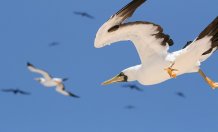Articles

Masked Booby in flight at Ascension Island, credit Sam Weber
Darwin grants for Exeter research
Three marine conservation projects involving University of Exeter scientists have been awarded funding by the UK government’s Darwin Initiative.
One of the projects – “a marine turtle action plan for Montserrat” – will be led by the university.
The others – “climate resilience and conservation of Ascension's biodiversity” and “building resilient, participatory management of marine biodiversity in hurricane-prone British Virgin Islands (BVI)” – will also involve Exeter researchers.
The scientists, all from the Centre for Ecology and Conservation on Exeter’s Penryn Campus in Cornwall, will work alongside organisations including the Marine Conservation Society (MCS).
“We were very pleased to be approached by our colleague at the Government of Montserrat to assist in the development and implementation of this exciting and timely project,” said Dr Nicola Weber, who will lead the Monserrat project, which has been awarded £286,504 over two years.
“We are extremely grateful to the Darwin Initiative for funding this important work that will provide the scientific evidence and training required to monitor and conserve Montserrat’s regionally important marine turtle populations.
“The overseas team will bring their expertise and experiences from similar projects that they have led in a number of the other UK Overseas Territories, while ensuring that the project is driven by local needs and wishes.
“On a personal note, I am pleased that I drank from the ‘Runaway Ghaut’ when last in Montserrat, thus confirming the local legend that those that do so are destined to return to the island again.”
As well as nest monitoring, the project will map nesting beaches by drone and, in conjunction with MCS (a UK NGO), the team will engage community members using the “Community Voice” filming method which has been employed in UK and Turks and Caicos Islands previously.
Dr Sam Weber, part of the Ascension Island project, said: “Ascension Island is one of the world’s remotest islands, home to globally important nesting aggregations of seabirds and turtles, a unique endemic flora and one of the Atlantic’s largest Marine Protected Areas (MPA), designated in 2019 to protect the near-pristine waters that surround it.
“However, Ascension’s isolation and highly protected status do not render it immune to global environmental pressures.
“Like many small islands, climate change in particular has long been recognised as an incipient threat to Ascension’s biodiversity and its new MPA, but the scale and extent of its impacts are ill-defined and few mitigation actions are currently in place.”
The Darwin-funded project on Ascension – which builds on a long-running partnership between the University of Exeter and Ascension Island Government – will attempt to change this by moving from a position where climate change is treated as a diffuse, unquantifiable threat to something that can be predicted and tackled in a very real and practical way.
Dr Weber added: “Actions taken on Ascension cannot prevent climate change, but this project will enable us to anticipate its major consequences and implement adaptation measures to lessen its effects on protected habitats and species.”
This project has been awarded £261,894 awarded over two-and-a-half years.
The BVI project, which involves the MCS, the BVI government and local NGO Association of Reef Keepers, has been awarded £241,553 over two-and-a-half years.
The project seeks to design and deliver a revised Sea Turtle Recovery Action Plan in conjunction with key stakeholders, including the fishing community.
Professor Brendan Godley said: “I am delighted to have been asked to help on this project.
“BVI has had a hard time with massive impacts of Hurricane Irma and now the tourism slowdown from the COVID-19 pandemic.
“As with many of the UK Overseas Territories, BVI is a place with amazing natural assets.
“Sea turtles are fantastic flagship species for conservation of BVI’s wonderful beaches, mangroves, seagrasses and reefs.”
The Darwin Initiative is a UK government grants scheme that helps to protect biodiversity and the natural environment in developing countries.
The three project involving Exeter scientists are all supported by the Darwin Plus scheme, which funds work in UK Overseas Territories.
Amdeep Sanghera, MCS’s UK Overseas Territories Conservation Officer, said: “We are absolutely delighted to have received crucial Darwin Plus funding for two new projects in the British Virgin Islands and Montserrat.
“These projects will help us understand the status of turtle populations in these UK Overseas Territories, and how people are dependent upon them.
“In the face of climate change, habitat destruction and overfishing, it’s vital we develop resilience in these island’s marine ecosystems for the turtles and for the people that also depend on them for the economy and well-being.
These grants will allow our partnerships to fully engage with local communities in developing strategies to safeguard sea turtles and their habitats in these two amazing places.”
Date: 22 June 2020
